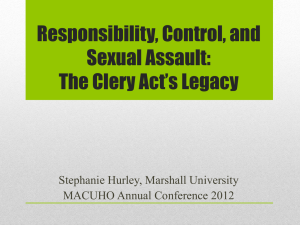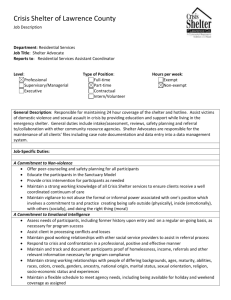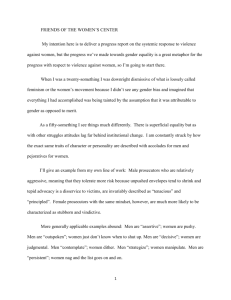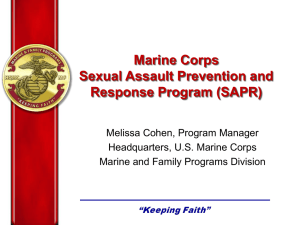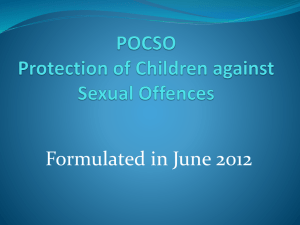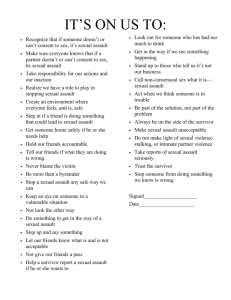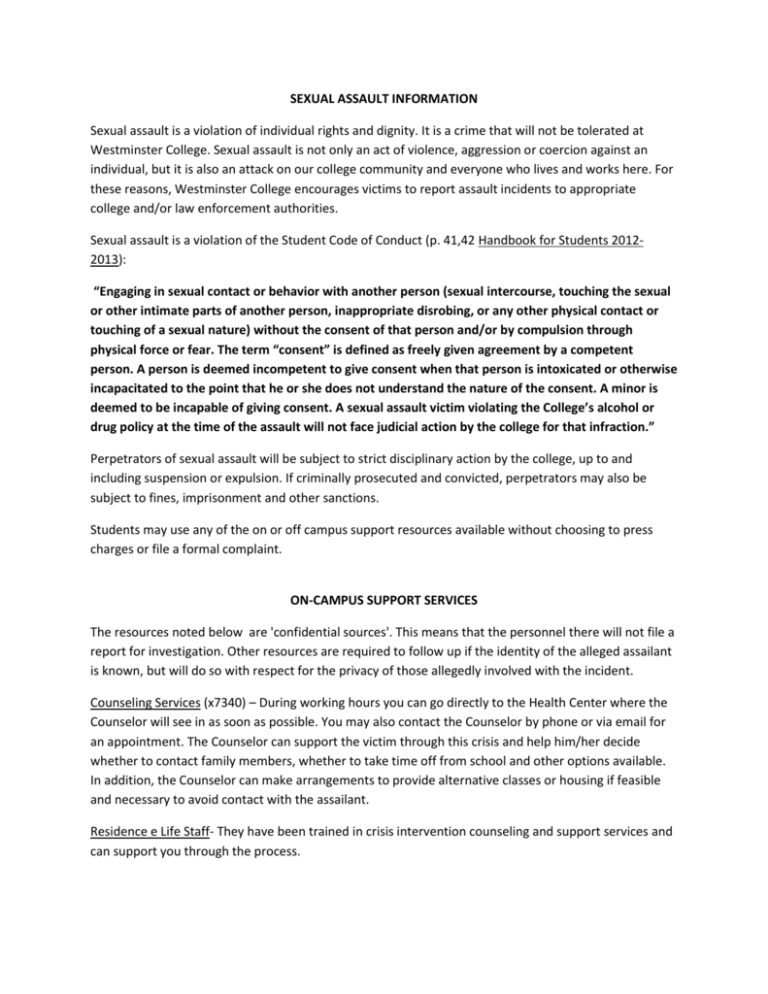
SEXUAL ASSAULT INFORMATION
Sexual assault is a violation of individual rights and dignity. It is a crime that will not be tolerated at
Westminster College. Sexual assault is not only an act of violence, aggression or coercion against an
individual, but it is also an attack on our college community and everyone who lives and works here. For
these reasons, Westminster College encourages victims to report assault incidents to appropriate
college and/or law enforcement authorities.
Sexual assault is a violation of the Student Code of Conduct (p. 41,42 Handbook for Students 20122013):
“Engaging in sexual contact or behavior with another person (sexual intercourse, touching the sexual
or other intimate parts of another person, inappropriate disrobing, or any other physical contact or
touching of a sexual nature) without the consent of that person and/or by compulsion through
physical force or fear. The term “consent” is defined as freely given agreement by a competent
person. A person is deemed incompetent to give consent when that person is intoxicated or otherwise
incapacitated to the point that he or she does not understand the nature of the consent. A minor is
deemed to be incapable of giving consent. A sexual assault victim violating the College’s alcohol or
drug policy at the time of the assault will not face judicial action by the college for that infraction.”
Perpetrators of sexual assault will be subject to strict disciplinary action by the college, up to and
including suspension or expulsion. If criminally prosecuted and convicted, perpetrators may also be
subject to fines, imprisonment and other sanctions.
Students may use any of the on or off campus support resources available without choosing to press
charges or file a formal complaint.
ON-CAMPUS SUPPORT SERVICES
The resources noted below are 'confidential sources'. This means that the personnel there will not file a
report for investigation. Other resources are required to follow up if the identity of the alleged assailant
is known, but will do so with respect for the privacy of those allegedly involved with the incident.
Counseling Services (x7340) – During working hours you can go directly to the Health Center where the
Counselor will see in as soon as possible. You may also contact the Counselor by phone or via email for
an appointment. The Counselor can support the victim through this crisis and help him/her decide
whether to contact family members, whether to take time off from school and other options available.
In addition, the Counselor can make arrangements to provide alternative classes or housing if feasible
and necessary to avoid contact with the assailant.
Residence e Life Staff- They have been trained in crisis intervention counseling and support services and
can support you through the process.
Safety and Security Department (x3666) - The Westminster College Public Safety staff can assist you by
contacting the support person of your choice, if you so desire, providing transportation within the area,
working with the New Wilmington Police Department and discussing options available to you.
Student Health Center (x7927) – Health Center staff can assist you in any way necessary. An
appointment can be made with the college Physician or make arrangements to get to the hospital
emergency room.
SAFE Advisors -This is a group of campus students and staff who have received specialized training to be
advocates of victims of sexual assault. The list of SAFE advisors can be found on the Counseling Services
website under Emergency Services.
Community Support Services and a list of area hospitals can be found on the Counseling Services
website under Emergency Services.
REASONS FOR REPORTING
• Reporting returns a feeling of personal power. You may be able to provide information that will lead
to an arrest and conviction. Assailants should be held accountable.
• Reporting will remind people that sexual assaults really do occur and can happen to anyone.
• Reporting can prevent others from being sexually assaulted by making them aware of assaults and
where they are occurring.
• Report even if alcohol or drugs were involved. A common concern students have is the fear of
reporting due to worry about alcohol or drug violations. Do not let this stop you, as our primary concern
is your safety and the safety of others.
• Reporting can result in the accused individual facing sanctions that can include disciplinary action up
to suspension, expulsion or dismissal.
• If you are hesitant to report for fear of retaliation, you can reduce the risk by filing a Protection from
Abuse order obtained through the Lawrence County Courthouse in New Castle. While this gives added
protection, it is not a guarantee. Police will respond promptly, but they cannot provide 24-hour
surveillance. The college can also issue a “Cease and Desist” order to the perpetrator stating that they
are to not have any contact whatsoever with the victim or they will be subject to disciplinary action.
HOW CAN YOU PROTECT YOURSELF?
There is no perfect way to protect yourself, but you can minimize your risk. Logic and common sense are
your best defenses. Some of the ways to help reduce your risk are to:
• Be alert and walk with confidence.
• Be aware of your surroundings.
• Not let alcohol or other drugs fog your judgment.
• Be assertive. Don't let people violate your space.
• Trust your instincts. Uneasy? Uncomfortable? GET OUT!
• NEVER prop doors open.
• ALWAYS lock your door.
• Communicate your feelings.
• No ALWAYS means 'no!'
Remember, both women and men can be victims of sexual assault. If you are a victim of an assault,
please report it.
KNOW YOUR DEFENSES
Use your head to protect your body. Now is the time to consider your options. There is little time to
think during an attack. People have different capabilities, and you must decide for yourself the best
defense method for you. There are several ways to react to a sexual assault:
Passive Resistance
The goal of passive resistance is to think and talk your way out of the situation. Try to talk the attacker
out of the attack by saying you are pregnant or have a sexually transmitted disease.
Active Resistance
Active resistance is designed to distract or temporarily injure your attacker, not to incapacitate him. This
may discourage the attacker, but it may cause the attacker to become more violent. Only you can decide
whether to fight or not. If you choose to fight, be forceful and fight only long enough to create an
opening to escape.
Submitting to the Attack
If you believe you might become seriously injured by defending yourself or if you're afraid to fight back,
don't! It is still rape and still a crime, even if you do not have a single cut or bruise. Victims who do not
resist should never feel guilty; it is the rapist who committed the crime.
WESTMINSTER COLLEGE SEXUAL ASSAULT VICTIMS BILL OF RIGHTS
In compliance with Section 485 of the Higher Education Act of 1965 (20 U.S.C. 1092(f), as amended by
the Student Right-to-Know and Campus Security Act, Public Law 101-542, as amended by the Higher
Education Technical Amendments of 1991, Pubic Law 102-26 (April 9, 1991) and 102-325 (July 23, 1992),
and the Campus Sexual Assault Victims’ Bill of Rights Act of 1991, victims of campus-related sexual
assaults shall be accorded the following rights by all Westminster College campus officers,
administrators and employees.
A. The right to have any and all sexual assaults against them treated with seriousness, the right to be
treated with dignity, and the right for campus organizations that assist such victims to be accorded
recognition.
B. The right to have sexual assaults committed against them investigated and adjudicated by the duly
constituted authorities of the governmental entity in which the crimes occurred and the right to the full
and prompt cooperation and assistance of campus personnel in notifying the proper authorities. The
foregoing shall be in addition to any campus disciplinary proceedings.
C. The right to be free from any kind of pressure from campus personnel to: (1) not report crimes
committed against them to civil/criminal authorities or to campus law enforcement/disciplinary officials;
or (2) report crimes as lesser offenses than the victims perceive them to be.
D. The right to be free from any kind of suggestion that campus sexual assault victims not report, or
under-report, crimes because: (1) victims are somehow “responsible” for the commission of crimes
against them; (2) victims are contributorily negligent or assumed the risk of being assaulted; or (3) by
reporting crimes, the victim would incur unwanted personal publicity.
E. The same right to legal assistance, or ability to have others present, in any campus disciplinary
proceeding that the institution affords the referred; and the right to be notified of the outcome of such
proceeding.
F. The right to full and prompt cooperation from campus personnel in obtaining, securing, and
maintaining such information (including a medical examination) as may be necessary to the proof of
criminal sexual assault in subsequent legal proceedings.
G. The right to be made aware of and assisted in exercising any options as provided by State and Federal
laws or regulations with regard to mandatory testing of sexual assault suspects for communicable
diseases and with regard to notification to victims of the results of such testing.
H. The right to counseling from any mental health services previously established by the institution, or
by other victim-service entities, or by victims themselves.
I. After campus sexual assaults have been reported, the victims of such crimes shall have the right to
require that campus personnel take the necessary steps or actions reasonably feasible to prevent any
unnecessary or unwanted contact or proximity with alleged assailants, including immediate relocation of
the victim to safe and secure alternative housing, and transfer of classes if requested by the victims.
J. In addition to the above rights, students, whether sexual assault victims or not, have a right to
habitability in campus accommodations for which the college receives any compensation, direct or
indirect. Habitability shall mean an environment free from sexual or physical intimidation, or any other
continuing disruptive behavior that is of such a serious nature as would prevent a reasonable person
from attaining their educational goals. Substantiated violations of the above listed habitability provisions
shall be corrected by campus personnel by relocations, if reasonably possible, of the complainant to an
acceptable, safe and secure alternative location as soon as practicable, unless the conditions of
nonhabitability demonstrate the necessity of immediate action by campus personnel. These rights are
established and are implemented in conjunction with the Westminster College Sexual Harassment Policy
and Procedures, which include informal procedures for counseling and mediation and formal complaint
procedures.

